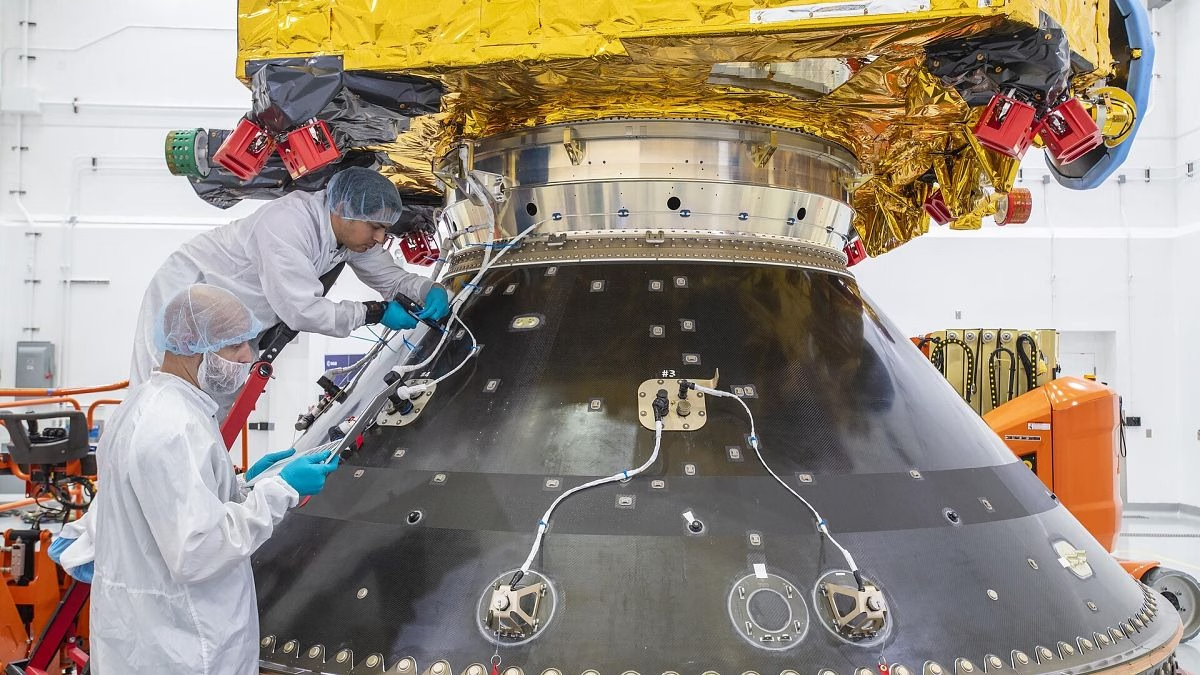<
div style=”–widget_related_list_trans: ‘Related’;”>
Defence companies are becoming increasingly involved in space industries.
Although space and defence industries have always been connected, with emphasis until now placed on civilian use rather than developing military space technologies — this focus is now shifting.
“Although many leading European space companies have origins as subsidiaries of defence companies, or are deeply rooted in defence business structures, this pattern decreased up until the early 2020s,” according to the European Space Policy Institute (ESPI).
Since mid-2022 in particular, the trend has accelerated, with more defence companies entering the space sector — building on past activities or as a new strategy for the future.
“The return of war to Europe, the emergence of antisatellite threats, and the growing militarisation of space by other powers force us to see space as a foundation of our strategic sovereignty,” MEP Christophe Grudler (France/Renew Europe) remarked to Euronews.
Grudler, who co-leads the European Parliament’s intergroup on Sky and Space, anticipated that too many member states are creating separate national plans, which is leading to a lack of coordination and disunity.
“We need a common European effort — and that means concentrating on programs designed, funded and managed at the EU level,” the French liberal noted.
Europe’s investment in space remains limited, at around just 0.07% of GDP — or €14bn per year, with a slow but steady shift towards tailor-made security and military capabilities, explains Matija Rencelj, the research manager at ESPI.
“We still face a significant capability gap, and the investment required to realise the extra value of space is estimated to be between 0.15 and 0.25% of the European GDP by 2040,” Rencelj stressed.
The head of the European Space Agency (ESA), an agency made up of 23 member states including Norway, Switzerland, and the UK, notes that compared to global counterparts such as China, the US, India, or Japan, Europe is currently spending very little on space for defence.
“The positive aspect is that Europe is capable. We have some of the best space engineers and scientists to work with space technologies, and we have excellent companies of world standard, so we can achieve this,” Josef Aschbacher, the ESA director, told Euronews during an interview in Warsaw.
At present, only 15% of Europe’s public space funds are allocated to military space activities — far below the global average of around 50%, signalling a growing military focus.
In this context, several European countries — including Austria, France, Italy, Luxembourg, and Sweden — have developed military strategies dedicated to space. On the whole, however, Europe is still slow to respond when it comes to developing and utilising its own capacity, says ESPI.
Grudler suggests the EU must invest in several areas: pooling resources through common European programs, creating a true European space procurement capacity, and fully integrating space within a long-term industrial strategy — on the same level as semiconductors, energy or artificial intelligence.
“We don’t have to copy the United States step by step. But we need political vision, unity, and continuity,” he stated.
Meanwhile, ESA’s director general highlighted the need for a significant budget increase.
“We have an opportunity towards the end of the year with the ESA Ministerial Conference, and this will represent a crucial moment where Europe commits to truly boost space investment to ensure we keep up with international space activities,” Aschbacher noted.
At the last ESA council ministerial meeting in Paris in 2022, member states boosted the agency’s budget by 17%, reaching a record €16.9 billion.
In November 2025, ESA’s
Source: https://www.euronews.com/my-europe/2025/04/17/europes-defence-sector-bets-on-space-amid-growing-geopolitical-threats





